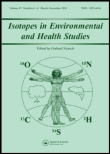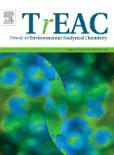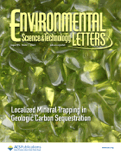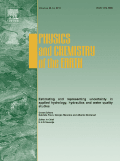
ISOTOPES IN ENVIRONMENTAL AND HEALTH STUDIES
Scope & Guideline
Illuminating Environmental Pathways through Isotopic Research
Introduction
Aims and Scopes
- Stable Isotope Hydrology:
The journal emphasizes studies related to the hydrological cycle using stable isotopes, providing insights into water sources, groundwater-surface interactions, and the impacts of environmental changes on hydrological systems. - Environmental Radioactivity Assessment:
Research on the assessment of natural and anthropogenic radioactivity levels in various environmental matrices, including soil, water, and biota, is a key focus, particularly concerning public health implications. - Ecological and Biological Applications of Isotopes:
The journal covers applications of isotopes in ecology and biology, such as tracing nutrient sources, studying food webs, and assessing physiological responses in organisms under various environmental stresses. - Innovative Analytical Techniques:
The focus on developing and applying innovative isotopic measurement techniques and methodologies is crucial, enhancing the precision of isotope analysis and expanding its applications in environmental studies. - Climate Change Impacts:
The journal addresses the implications of climate change on isotopic signatures in various ecosystems, contributing to a better understanding of past and present climate variability.
Trending and Emerging
- Integration of Machine Learning and Isotope Analysis:
Recent publications have shown a growing trend in utilizing machine learning techniques to analyze isotopic data, enhancing the ability to predict patterns and make sense of complex datasets in environmental studies. - Health Implications of Isotope Research:
An increasing number of studies are exploring the health implications of isotopic findings, particularly concerning environmental radiation exposure and its effects on human health, highlighting the journal's commitment to public health. - Focus on Climate Resilience and Adaptation:
There is a noticeable trend towards research that assesses the impacts of climate change on ecosystems and water resources, utilizing isotopes to evaluate resilience and adaptation strategies in various environmental contexts. - Innovative Applications in Food and Water Safety:
Research is increasingly focusing on the application of isotopes in assessing food safety, traceability, and water quality, which is becoming critical in the context of global food security and environmental health. - Comprehensive Multi-Isotope Studies:
The journal is trending towards studies that utilize multiple isotopes simultaneously to provide a more holistic understanding of ecological processes, nutrient cycling, and environmental changes, reflecting an interdisciplinary approach.
Declining or Waning
- Traditional Radiocarbon Dating:
There has been a noticeable reduction in studies focused on conventional radiocarbon dating techniques, likely due to the advent of more advanced isotopic methodologies and dating techniques that provide more reliable data. - Basic Isotope Ratio Studies:
Research that merely focuses on basic stable isotope ratio comparisons without integrating them into broader ecological or environmental contexts appears to be decreasing, suggesting a shift towards more applied and interdisciplinary approaches. - Isotope Studies in Less Explored Regions:
There seems to be a waning interest in isotopic studies conducted in less explored or remote regions, as researchers increasingly focus on well-documented areas where isotopic applications can yield more significant insights.
Similar Journals

Trends in Environmental Analytical Chemistry
Exploring Innovative Solutions for Environmental ChallengesTrends in Environmental Analytical Chemistry, published by Elsevier, serves as a leading platform for scholars and professionals in the fields of analytical and environmental chemistry. With an impact factor that places it in the Q1 category for both analytical chemistry and environmental chemistry, this journal attracts cutting-edge research that addresses current challenges in environmental analysis from 2014 to 2024. The journal is dedicated to advancing the knowledge base through the publication of high-quality empirical studies, innovative methodologies, and comprehensive reviews that reflect the latest trends and technological advances in the field. Operating out of the Netherlands, the journal's commitment to excellence is evident in its impressive Scopus rankings, standing as the #1 journal in Analytical Chemistry and #7 in Environmental Chemistry by percentiles. This makes it an essential resource for academics, practitioners, and students alike who are eager to stay informed on impactful environmental research and analytical techniques.

Rocznik Ochrona Srodowiska
Championing Environmental Protection through Scholarly ContributionsRocznik Ochrona Srodowiska, published by the Middle Pomeranian Scientific Society for Environmental Protection, is an esteemed journal dedicated to advancing the field of environmental science in Poland and beyond. With an ISSN of 1506-218X, this peer-reviewed journal has established itself as a vital resource since its inception in 2007, addressing various environmental issues and promoting sustainable practices. Currently holding a Q3 category ranking in the Environmental Science (miscellaneous) field for 2023, it places itself in the 23rd percentile of Scopus rankings, reflecting a growing influence in the broader environmental research community. While the journal is not open access, it serves as an important conduit for researchers, professionals, and students to disseminate their findings and contribute to the interdisciplinary dialogue aimed at tackling pressing environmental challenges. With a commitment to rigorous research and practical applications, Rocznik Ochrona Srodowiska remains an essential platform for fostering innovation and collaboration in environmental studies.

JOURNAL OF THE AMERICAN WATER RESOURCES ASSOCIATION
Advancing water resource management through innovative research.The JOURNAL OF THE AMERICAN WATER RESOURCES ASSOCIATION, published by Wiley, is a premier platform dedicated to advancing the field of water resource management and research. With an ISSN of 1093-474X and an impressive Q1 ranking in multiple categories, including Earth-Surface Processes, Ecology, and Water Science and Technology, this journal serves as a vital resource for professionals, researchers, and students alike. Established in 1967 and set to converge through 2024, it has consistently published cutting-edge research that influences policy and practice in water resource management. The journal's open access option enhances its reach, ensuring that critical findings are accessible to a wider audience. The Scopus rankings further underscore its impact, placing it in the top quartile within its fields, highlighting its importance in shaping scholarly discourse. As a significant contributor to the understanding and management of freshwater systems, the journal offers a crucial means for sharing insights and fostering collaboration in the vital realm of water resources.

Brazilian Journal of Analytical Chemistry
Catalyzing Collaboration in Analytical ChemistryBrazilian Journal of Analytical Chemistry, published by VISAO FOKKA COMMUNICATION AGENCY, serves as a vital platform for those engaged in the field of analytical chemistry, especially within the Latin American context. With an ISSN of 2179-3425 and an E-ISSN of 2179-3433, this journal aims to promote high-quality research and advancements in analytical methodologies, instrumentation, and applications spanning from 2010 to the present. Although it currently holds a Q4 rank in Analytical Chemistry by Scopus and is placed at the 24th percentile, its commitment to open access publishing provides invaluable opportunities for widespread dissemination of knowledge, catering to researchers, professionals, and students alike. The journal's editorial board comprises emerging and established experts aiming to bridge gaps in analytical chemistry research, particularly in a Brazilian and broader South American context. Situated in São Paulo, Brazil, the journal's role in fostering innovation and collaboration in analytical techniques makes it an essential resource for the academic community.

Grundwasser
Connecting research and practice in groundwater science.Grundwasser is a prominent academic journal hosted by SPRINGER HEIDELBERG, dedicated to advancing knowledge in the field of water science and technology. With its ISSN 1430-483X and E-ISSN 1432-1165, the journal serves as a crucial platform for disseminating research findings, methodologies, and case studies related to groundwater management, hydrology, and environmental sustainability. Since its inception in 1997 and continuing through 2024, Grundwasser has established itself within the Q3 quartile of the Water Science and Technology category, as recognized by Scopus, ranking #164 out of 261 in Environmental Science. The journal emphasizes rigorous peer-reviewed content, aimed at fostering a deeper understanding of groundwater systems, their ecological implications, and the challenges posed by climate change. Researchers, professionals, and students are encouraged to delve into the latest studies and contribute to this vital area of environmental science, contributing to both academic knowledge and practical applications in groundwater sustainability.

Environmental Science & Technology Letters
Leading the charge in ecological innovation and sustainability.Environmental Science & Technology Letters, published by the American Chemical Society, stands as a premier journal in the realm of environmental science and technology, focusing on pivotal studies that address pressing environmental challenges. With an impressive Q1 ranking in multiple categories including Ecology, Environmental Chemistry, and Pollution, this journal maintains a position of excellence within its field, achieving Scopus ranks that place it in the top percentile of Environmental Science disciplines. Although not open access, Environmental Science & Technology Letters offers vital insights and cutting-edge research that contribute significantly to the understanding and management of environmental issues. The journal’s objectives include disseminating ground-breaking findings and promoting discussions that lead to sustainable solutions. With convergence from 2013 to 2024, it continues to serve as an essential resource for researchers, professionals, and students committed to advancing knowledge and innovation in environmental science.

PHYSICS AND CHEMISTRY OF THE EARTH
Innovating Research in Geophysics and PetrologyThe Physics and Chemistry of the Earth is a premier interdisciplinary journal published by Pergamon-Elsevier Science Ltd, dedicated to advancing the understanding of Earth sciences through the integration of geophysical and geochemical perspectives. With an ISSN of 1474-7065 and an E-ISSN of 1873-5193, the journal serves as a critical platform for researchers and professionals to disseminate key findings and innovative methodologies in the realms of geophysics and petrology. As of 2023, it proudly holds a Q2 ranking in both Geochemistry and Petrology and Geophysics, reflecting its robust impact in the scientific community, with Scopus rankings that position it in the top 20% and 32% of its respective categories. Notably, the journal is available in an open-access format, allowing for greater dissemination and accessibility of research contributions. With a publication history spanning from 1992 to 2024, Physics and Chemistry of the Earth stands as a vital resource for ongoing research and discovery in the Earth sciences, making it an essential read for academics and practitioners alike.

Journal of Elementology
Innovating methodologies for a healthier planet.The Journal of Elementology, published by the Polish Society Magnesium Research, serves as a vital resource in the fields of Ecology, Health, Toxicology and Mutagenesis, Inorganic Chemistry, and Pollution. With an ISSN of 1644-2296 and a continuous publication record since 2008, this journal provides a platform for the dissemination of significant research findings and innovative methodologies. Although it operates under a traditional access model, its contributions are vital for advancing understanding in environmentally and health-related chemical studies, especially concerning elemental research. The journal is classified in the Q4 quartile across various categories, indicating emerging research insights that can strengthen foundational knowledge and foster further exploration in these vital areas. Authors and researchers can benefit from the journal's focus on comprehensive and practical studies, aimed at addressing both theoretical and applied aspects of element-related research, as it contributes to the scientific community's collective efforts toward sustainable environmental practices.

JOURNAL OF ENVIRONMENTAL RADIOACTIVITY
Pioneering insights into radioactive contamination and health.JOURNAL OF ENVIRONMENTAL RADIOACTIVITY, published by Elsevier Science Ltd, is a prestigious peer-reviewed journal dedicated to the field of environmental science with a particular focus on the implications and management of radioactivity in the environment. Since its inception in 1984, the journal has served as a vital platform for researchers, scientists, and professionals to disseminate new findings that intersect with areas such as environmental chemistry, health, toxicology, pollution, and waste management. With a strong reputation reflected in its 2023 Q2 rankings across multiple categories and respectable Scopus rankings, it offers valuable insights and rigorous research that shape the discourse on environmental safety and public health. Although it does not operate under an open-access model, subscribers benefit from high-impact articles that push forward the boundaries of knowledge in the management and understanding of radioactive contaminants. This journal is essential for anyone involved in environmental research or policy-making who seeks to stay informed about the latest developments in this critical area of study.

RADIOCHEMISTRY
Pioneering Insights in Radiochemical ApplicationsRADIOCHEMISTRY, published by PLEIADES PUBLISHING INC, is a prominent journal focusing on the dynamic field of radiochemistry, encompassing both theoretical and experimental research in the application of radioactive elements and isotopes across various scientific domains. With the ISSN 1066-3622 and e-ISSN 1608-3288, this journal has been a vital resource for scholars since its inception, converging years of valuable research from 2003 to 2024. The journal currently holds a Q4 category quartile in the Physical and Theoretical Chemistry field, reflecting its niche position within this specialized discipline. Despite ranking #156 out of 189 in Scopus for Chemistry Physical and Theoretical Chemistry, with a 17th percentile ranking, RADIOCHEMISTRY continues to serve as an important forum for advancing knowledge and fostering collaboration among researchers and professionals dedicated to the study of radiochemical processes. Although it does not offer Open Access, researchers are encouraged to delve into its rich content for insights and advancements in radiochemistry.